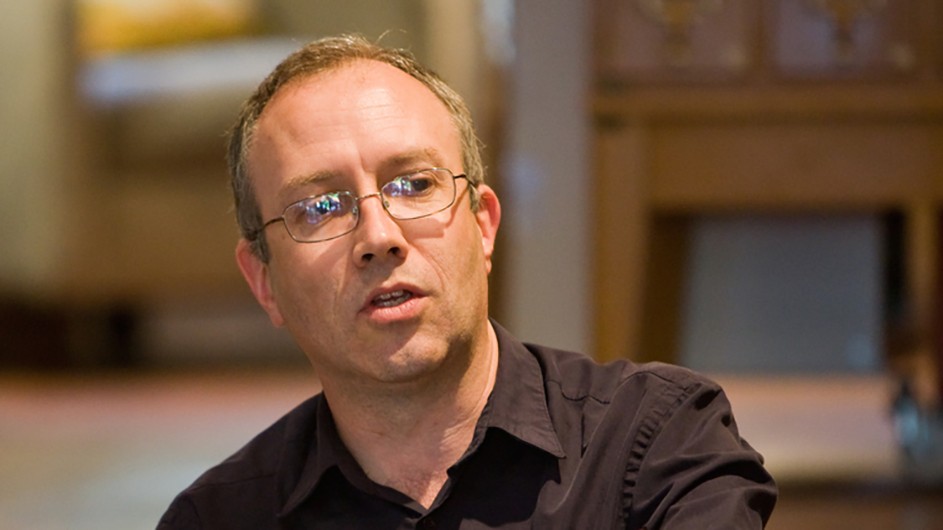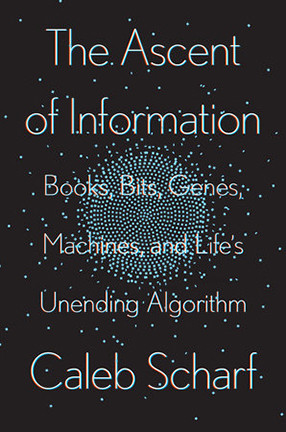The Information We Create Has a Life of Its Own
In his new book, astronomer Caleb Scharf explores how our relationship with data will affect our ongoing evolution as a species.

One of the most peculiar and possibly unique features of humans is the vast amount of information we carry outside our biological selves. But in our rush to build the infrastructure for the 20 quintillion bits we create every day, we have failed to ask exactly why we’re expending ever-increasing amounts of energy, resources, and human effort to maintain all this data.
Drawing on deep ideas and frontier thinking in evolutionary biology, computer science, information theory, and astrobiology, Astronomy Senior Lecturer Caleb Scharf argues in his new book, The Ascent of Information: Books, Bits, Genes, Machines, and Life’s Unending Algorithm, that information is, in a very real sense, alive. All the data we create—including emails, tweets, selfies, and AI-generated text—amounts to an aggregate life form with its own goals and needs. It can control our behavior and influence our well-being. And it’s an organism that has evolved right alongside us.
The Ascent of Information offers a vision of a universe built of, and for, information. Scharf explores how our relationship with data will affect our ongoing evolution as a species. Understanding this relationship will be crucial to preventing our data from becoming more of a burden than an asset.
Scharf recently discussed the book with Columbia News, as well as what dataome means, what books he’s recently read, and who he would like to sit across from at a dinner party.
Q. What inspired you to write this book?
A. The original idea came from my research in astrobiology on the nature of life in the universe and how we might find life elsewhere. Our biggest challenges are in figuring out what life really is, and, on top of that, what really counts as intelligence or technology. These puzzles got me thinking about how humans are unique on earth in terms of how we externalize information, carrying this extraordinary informational baggage around that's not encoded in our DNA.
Right now, our external information is staggeringly huge and growing at an unbelievable rate: We generate more data each day than is in all the words ever spoken by every human who’s ever lived. Writing a book exploring the what, how, and why of all this seemed very timely!

Q. You coin the term dataome in the book. Could you describe what that means, and how it is the “central phenomenon” in understanding information?
A. The dataome is the sum total of our nongenetic information, whether in books, electronic bits, paintings, temporary neural impulses, or even structures like libraries and machines, which support and encode information in themselves. It's the informational “ome” that coexists with us here on earth. It's a new lens to examine our world through because it seems to have its own evolutionary imperatives.
In fact, I propose that the dataome is an alternate living system, in a deeply symbiotic relationship with us. That may sound outrageous, but it seems to fit with many ideas about the nature of information as a thing—akin to energy or entropy—and what we think life is. In a sense, life is what happens to matter when information takes control.
Q. How has social media and the internet influenced our accumulation of information?
A. Social media and the internet have profoundly changed the way at least half of the human population lives by unleashing new ways to generate and propagate data and information—and new ways to hardwire humans into this process. But, of course, not all of that information is of equal quality, and it's burdensome on our planet. I'd argue that the dataome is just doing what dataomes do—expanding into new niches. Social media is an emergent phenomenon, an evolutionary outburst that tightens our symbiotic relationship to the dataome.
Q. What books are you reading now, and why?
A. I'm already thinking about the next book to write! But reading helps with that. I just read The Princess Bride by William Goldman, which was the basis for the 1987 cult movie. The book is more clever than the movie, and breaks just about every wall between author and reader. It's utterly head-spinning and fantastically crafted. I read it out of curiosity, and to get inspiration for approaches to narrative.
I also just read Richard Powers' new novel, Bewilderment. I was asked to review it because astrobiology is a central part of the story. Suffice to say that it's a brilliant book, as you might expect from a Pulitzer Prize-winner like Powers. He expresses the commingled senses of hope, awe, and existential terror that science can produce.
Q. You’re hosting a dinner party. What three scholars, playwrights, celebrities, or philosophers, dead or alive, would you invite, and why?
A. For sheer intellectual curiosity: Toni Morrison, William Shakespeare, and Alan Turing. For sheer fun: Gene Roddenberry, the creator of Star Trek, astronomer Jill Tarter, and Arthur C. Clarke.